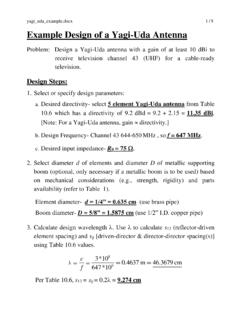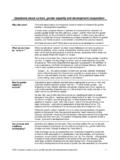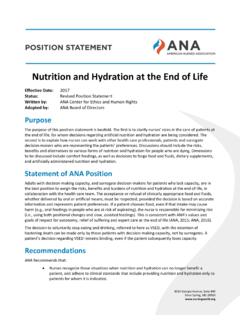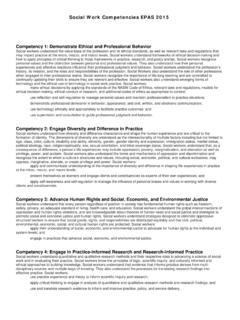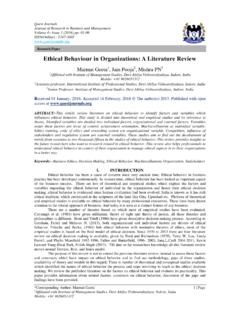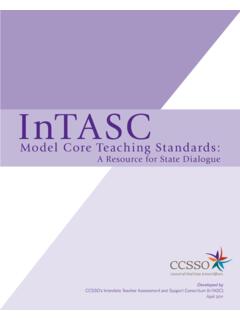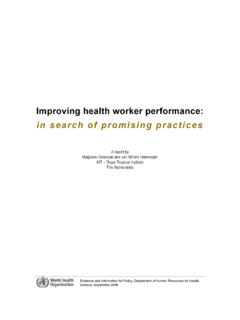Transcription of Professional and Ethical Responsibility for Engineers
1 Professional and Ethical Responsibility for Engineers Engineering, Ethics, and Society Professional responsibilities as Engineers What does Professional Responsibility mean? Why do Engineers have Professional responsibilities? How Engineers can act on their Professional responsibilities? Professional societies provide some guidance. 1/21/2016 2. Engineers ' Creed Adopted by National Society of Professional Engineers , June 1954. As a Professional Engineer, I dedicate my Professional knowledge and skill to the advancement and betterment of human welfare. I pledge: To give the utmost of performance.
2 To participate in none but honest enterprise;. To live and work according to the laws of man and the highest standards of Professional conduct;. To place service before profit, the honor and standing of the profession before personal advantage, and the public welfare above all other considerations. In humility and with need for Divine Guidance, I make this pledge. 1/21/2016 3. IEEE Code of Ethics Approved by IEEE Board of Directors August 1990. We, the members of the IEEE, in recognition of the importance of our technologies in affecting the quality of life throughout the world, and in accepting a personal obligation to our profession, its members and the communities we serve, do hereby commit ourselves to the highest Ethical and Professional conduct and agree: 1.
3 To accept Responsibility in making engineering decisions consistent with the safety, health and welfare of the public, and to disclose promptly factors that might endanger the public or the environment;. 2. to avoid real or perceived conflicts of interest whenever possible, and to disclose them to affected parties when they do exist;. 3. to be honest and realistic in stating claims or estimates based on available data;. 4. to reject bribery in all its forms;. 5. to improve the understanding of technology, its appropriate application, and potential consequences.
4 6. to maintain and improve our technical competence and to undertake technological tasks for others only if qualified by training or experience, or after full disclosure of pertinent limitations;. 7. to seek, accept, and offer honest criticism of technical work, to acknowledge and correct errors, and to credit properly the contributions of others;. 8. to treat fairly all persons regardless of such factors as race, religion, gender, disability, age, or national origin;. 9. to avoid injuring others, their property, reputation, or employment by false or malicious action.
5 10. to assist colleagues and co-workers in their Professional development and to support them in following this code of ethics. 1/21/2016 4. Environmental and Social Dimensions of Engineering (1 & 5). What responsibilities do Engineers have regarding environmental and social considerations ( , safety, health and welfare of the public)? Some topics to consider are moral development, risks both present & future, and sustainability. 1/21/2016 5. Conflicts of Interest (2). Different types of conflicts of interest- financial gain, work commitments, and intellectual & personal matters Financial- Example: Substantial investment in an outside company that would benefit from work.
6 There are , State, & local laws, regulations and policies relating to financial conflicts of interest. Conflict of commitment- Example: Working for more than one customer/employer. Intellectual & personal matters- Example: Personal belief(s) predispose/bias research. What strategies may mitigate or eliminate the impact of conflicts of interest? 1/21/2016 6. Engineering Misconduct (3,4,9). Main types- fabrication, falsification, bribery, and plagiarism/intellectual theft Make estimates & performance claims that are honest/realistic. , do not deliberately underbid a project and then change price(s) later.
7 , vacuum cleaner hp claims. Fabrication/falsification. , When conducting tests, inspections, etc, do the work; no pencil whipping or inappropriate shortcuts. Bribery- gifts' to decision makers, inspectors, . 1/21/2016 7. Engineering Misconduct cont. Plagiarism/intellectual theft are major violations of Professional integrity standards/engineering misconduct. What constitutes plagiarism? Google- the practice of taking someone else's work or ideas and passing them off as one's own. Always best to give proper credit. Intellectual theft- , reverse engineering products or code, violating patents, etc.
8 Conversely- Ethical Responsibility to protect data & trade secrets of customers ( , hacking, NDAs). What steps can be taken to handle allegations of engineering misconduct? 1/21/2016 8. Technical Competence & Integrity (5, 6, 7). Stay up to date in your field. , continuing education, advanced Professional training, etc. Undertake work that you are qualified to do. , Do not bid on jobs that you do not have capability to handle. Have co-workers/peers review your work. In turn, review and provide feedback to co- workers/peers. Very important job- can have huge impact on careers, company, and profession 1/21/2016 9.
9 Golden Rule (9, 10). Treat people ethically and fairly. Don't hurt/impugn the livelihoods or reputations of people or companies, destroy or damage property to gain unethical advantages. Aid co-workers/peers in meeting Professional and Ethical responsibilities. Improve the lives of people through your work. 1/21/2016 10. References/Resources National Society of Professional Engineers (NSPE) Institute of Electrical and Electronics Engineers (IEEE). Office of Research Integrity (ORI) Introduction to the Responsible Conduct of Research research (provides a good overview).
10 Responsible conduct of research (RCR) by American Psychological Association (many good links). General RCR Resources- (many good links). Collaborative Institutional Training Initiative (CITI), University of Miami, Responsible Conduct of Research Program Ethics Case Studies by Northeastern University case-studies 1/21/2016 11.

